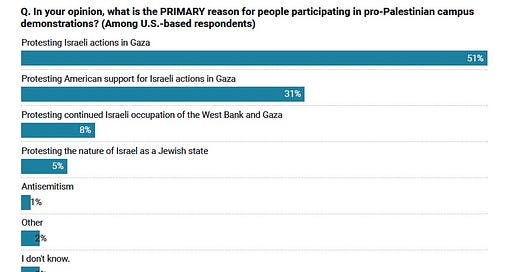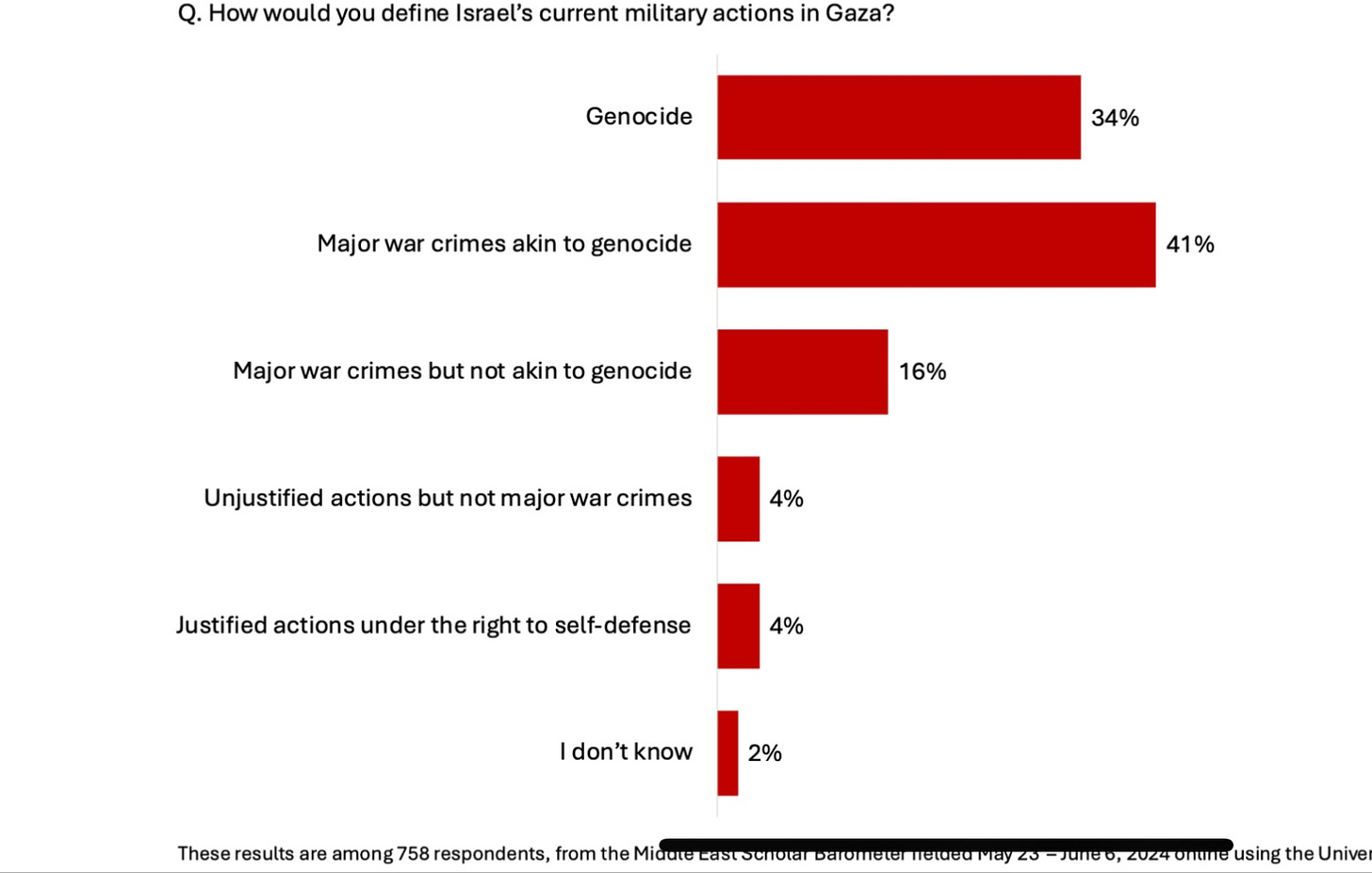Scholars Offer Grim Views on Gaza
Middle East scholars weigh in on the Gaza war, campus pressures, Biden, and the future of Israel/Palestine in the new wave of the Middle Scholars Barometer Survey.
Shibley Telhami and I have a new article in the Chronicle of Higher Education which shares some of the results of the seventh wave of the Middle East Scholars Barometer in late May and early June. I’m delighted to share that article with you, and to publish our second set of findings here exclusively for readers of the MENA Academy - though “delighted” may be the wrong word to convey their overwhelmingly grim views on the state of the war, the region, and their profession.
The Chronicle article focuses on the parts of the survey related to campus climate, student protests, and institutional pressures facing scholars of the Middle East. 71% of the more than 750 scholars who responded to the survey (the second largest number of responses we’ve received to a survey wave) say that the period since October 7 has been the worst or among the worst period professionally of their careers. Self-censorship remains rampant, as does the appalling array of institutional pressures on them to keep quiet about anything to do with Israel and Palestine (see the results of our November-December survey for more details on the earlier period).
The situation has evolved since then, both on the ground with the relentless devastation of Gaza and on campuses with the emergence of student protests and the often fierce backlash by college and university leadership. In this survey, we asked the scholars about their perspective on the Gaza protests and on the responses by higher education leaders — and about the war in Gaza itself, Israel’s goals, and the future of both Gaza and the broader Israeli-Palestinian relationship.
We report findings of the first set of questions in our new Chronicle article. Among the key findings:
On a scale of 1 to 5, where 1 is “indulgent” and 5 is “severe,” 40% rank their own administration’s response to the Gaza protests as either 4 or 5, while 77% rate American higher education institutions as a whole at that level. We interpret that gap as driven by the high media attention to extreme cases such as Columbia, UCLA, Texas and so many others.
The gap dividing campus leadership from faculty and students is profound. Roughly three quarters of respondents to the survey thought that the students and faculty at their institution were mostly supportive of the protest encampments or evenly divided, but only 21% said the same about their administration (only 4.4% said that their administration was mostly supportive, compared to 50.3% who said that about their students).
The scholars don’t seem as confused as a lot of pundits claim to be about the primary motivation of the protestors: 82% say that the pro-Palestinian demonstrations are primarily about protesting Israeli actions in Gaza or American support for Israeli actions in Gaza. Less than 1% believe antisemitism is the primary reason for the pro-Palestinian demonstrations, while about 5% see them as primarily protesting the nature of Israel as a Jewish state. That doesn’t mean that protestors might have multiple goals or that goals might not evolve over time — but it’s a strong signal about what faculty on campus think the protests are really about.
69% of respondents say that they support the campus encampments protesting the war and the primary goal of the protestors. Only 6% said they oppose the protests but support their goals, suggesting relatively little concern about the tactics being employed by students. At the same time, 14% support the protests but not their goals, a constituency which we assume is motivated primarily by academic freedom and the right to peaceful student activism.
They don’t think Biden has been helpful (we didn’t ask about Congress, but I imagine the reviews would have been even more scathing). Nearly three-quarters (74%) of US-based scholars say Biden has had a negative impact on advancing free speech on campus and 72% rate him negatively when it comes to advancing healthy campus environments.
Read the whole article at the Chronicle of Higher Education here. We only discussed about half of the results in that article; the rest are reported here for the first time. Let’s dig in to the key findings which weren’t reported there, and you can find the questionnaire and all the results here.
Vanishingly few scholars believe that advancing a two-state solution in any foreseeable future is a realistic option, and a large majority believe that war in Israel and Gaza is likely to lead to new large scale, long term displacement of Palestinians from Gaza and/or the West Bank. They are especially tough on the Biden administration’s handling of the war: Seventy-nine percent say Biden’s policy has had negative implications for American interests in the Middle East, 86% say it is negative for America’s standing in the world, and 80% say it is negative for advancing peace in Israel/Palestine.
The scholars surveyed generally see dark Israeli motives in Gaza. Over 90% of them view Israel’s actions in Gaza as at the least constituting major war crimes. Three quarters say that Israeli actions in Gaza are genocide (34%) or are akin to genocide (41%), with another 16% describing them as major war crimes but not akin to genocide. Only 4% describe Israel’s campaign in Gaza as justified actions under the right of self-defense. Instead, 57% say that Israel’s primary goal in Gaza is to make Gaza uninhabitable to force Palestinians out. 15% say Israel’s primary aim is to destroy Hamas and another 15% say the aim is to keep the Israeli government in power. And more than 90% say that the war has made sustained equitable peace between Israel and Palestinians less likely.
It is shocking, but perhaps not surprising, that 72% of the respondents believe that the war in Israel and Gaza is likely to lead to new large-scale, long-term displacement of Palestinians outsize Gaza and/or the West Bank. Over 95% expect the Gaza war to lead to increased violence on the West Bank. Over 90% think the Gaza war has made an Israeli war with Lebanon at least somewhat more likely (60% substantially more likely). To the extent that there’s a bright side, it’s that about 20% expect the status quo to hold between Israel and Iran.
The gloomy views about the prospects for Israeli-Palestinian peace predate Gaza and are rooted in a profoundly pessimistic view of the existing reality on the ground. As was the case prior to the war, almost two-thirds of respondents describe the reality in Israel and the occupied Palestinian territories as a “one state reality akin to apartheid,” compared to only 2% who see the reality as the state of Israel with temporary occupation of the West Bank and Gaza (there has been little change in these numbers since the earlier waves).
There is little confidence expressed in the efficacy of Biden’s diplomacy and support for Israel. Only 7% see positive effects on American interests in the Middle East and only 3% believe that Biden’s stance has improved American standing in the world. Biden’s response to critics has, in part, been to link its support for Israel to a push for a return to a process designed to result in a two-state solution and a durable political settlement. That’s an appealing goal, in principle, that’s backed by much of the international community. But the surveyed scholars are deeply pessimistic about any prospect of achieving a two-state solution in the foreseeable future. Only 7% of respondents see the two-state solution as possible and probable in the next ten years, with 45% saying it is no longer possible, and another 43% saying it is possible but improbable in the next ten years. And less than 10% think that the outcome of the war will result in effective US diplomacy towards Israel/Palestine.
Finally, our questions about attitudes towards BDS and boycotts of Israeli academic institutions, which are frequently included in the list of student demands, reveal relatively low levels of unconditional support or opposition compared with conditional positions (we asked a similar battery of questions last spring, you can read about that survey here). Only 23% of the surveyed academics unconditionally support boycotts of Israeli academic institutions, and almost a third (31%) unconditionally oppose them. A plurality of 40% support such boycotts conditionally (we did not ask in this survey about what specific conditions would trigger that support). That changes when the focus is not academic institutions: only 10% of respondents oppose all boycotts of Israel, 29% support them, and a solid majority of 57% support them conditionally. I was a little surprised that these numbers haven’t changed much over the last two years despite all that has happened, suggesting that these attitudes might be pretty baked in at this point.
You can read all of the results and methodological details here, as well as the previous six waves of the survey.





